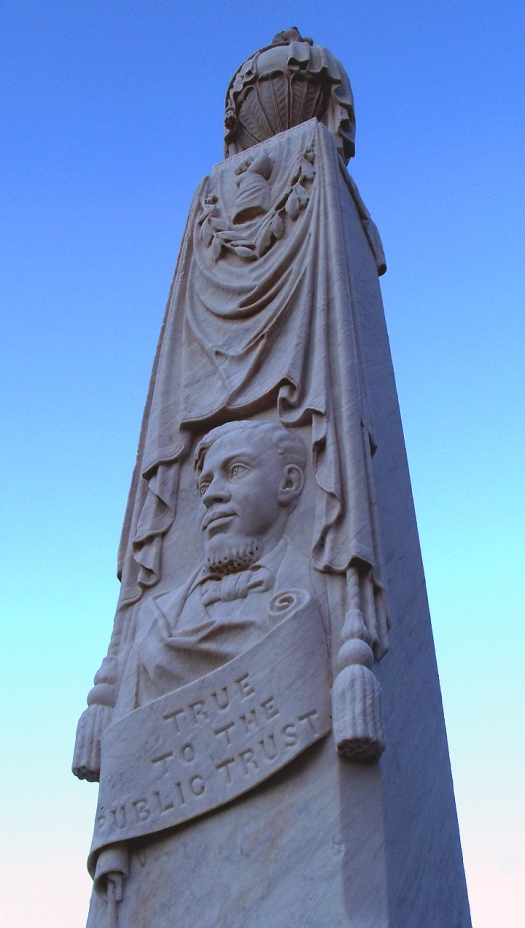Jon Clifton Hinson was born in Tylertown in Walthall County in southwestern Mississippi, in 1942, and attended public schools. In 1959, he worked as a page for Democratic U. S. representative John Bell Williams, who subsequently became governor of Mississippi in 1968. Hinson graduated from the University of Mississippi at Oxford in 1964, and joined the United States Marine Corps Reserve, in which he served until 1970.
Hinson worked on the U.S. House staff as a doorman in 1967, and then served on the staffs of representatives Charles H. Griffin, a Democrat, and Thad Cochran, a Republican. In 1978, Cochran ran successfully for the United States Senate, and Hinson was elected to succeed Cochran in the U.S. House of Representatives for Mississippi’s 4th congressional district. With 51.6 percent of the vote, Hinson defeated the Democrat John H. Stennis, the son of U.S. senator John C. Stennis, who finished with 26.4 percent of the vote. The remaining ballots were cast for independent candidates. Hinson entered the House in 1979.
During his re-election campaign in 1980, Hinson admitted that in 1976, while an aide to Senator Thad Cochran, he had been arrested for committing an obscene act after he exposed himself to an undercover policeman at the Iwo Jima Memorial in Arlington National Cemetery. Hinson denied that he was homosexual and blamed his problems on alcoholism. He said that he had reformed and refused to resign. He won re-election with a plurality of 38.97 percent of the vote. Independent Leslie B. McLemore polled 29.8 percent, and Democrat Britt Singletary received 29.4 percent.
Hinson was arrested again on February 4, 1981, and charged with attempted sodomy for performing oral sex on an African-American male employee of the Library of Congress in a restroom of the House of Representatives. At that time, homosexual acts were still criminalized even between consenting adults. The charge was a felony that could have resulted in up to ten years in prison, as well as fines of up to $10,000.
Since both parties were consenting adults (and social attitudes were changing), the United States Attorney’s office reduced the charge to a misdemeanor. Facing a maximum penalty of one year in prison and a $1,000 fine, Hinson pleaded not guilty to a charge of attempted sodomy the following day and was released without bail pending a trial scheduled for May 4, 1981. Soon thereafter he checked himself into a Washington, D.C.-area hospital for treatment. Hinson later received a 30-day jail sentence, which was suspended, and a year’s probation, on condition that he continued counseling and treatment.
Hinson resigned on April 13, 1981, early in his second term. He said that his resignation had been “the most painful and difficult decision of my life.” He was succeeded in the House by Wayne Dowdy, a Democrat, who won the special election held in the summer of 1981. Soon afterward Hinson acknowledged that he was homosexual and became an activist for gay rights. He later helped to organize the lobbying group “Virginians for Justice” and fought against the ban on gays in the military. He also was a founding member of the Fairfax Lesbian and Gay Citizens Association in Fairfax County.
He never returned to Mississippi but lived quietly in the Washington area, first in Alexandria, Virginia, and then Silver Spring, Maryland. Hinson also disclosed that he survived a 1977 fire that killed nine people at the Cinema Follies, a Washington theater that catered to gay customers. He was rescued from under a pile of bodies, one of only four survivors.
It’s safe to assume that there are closeted government officials at every level—federal, state and local, doubtless from both parties—who are representing their electorate in good faith to the public trust with which they’re invested. From our perspective Hinson’s crash and fall seems not so much a tragedy as it is a farce, the ridiculous result of a man coerced, perhaps even forced into a role he could not play. It’s impossible for us to imagine the pressures put upon him to become a pillar of the Republican Party in its struggle for a stranglehold on the state of Mississippi, but the weight broke the man, reduced him to disgrace, poverty and exile.
Hinson himself is far from blameless; as an openly gay man he would never have been elected to any office in the state of Mississippi, but there’s no reason to doubt that he could have represented his district capably had he exercised more discretion if not to say caution in his personal affairs. Perhaps that’s what he was trying to do, but it’s more probable that like many gay men of his generation in the South, he only knew clandestine solicitation as a venue for sexual commerce.
Hinson, unremembered for any legislation and with no other legacy than creating an eddy in the incessant tide of Republication domination in Mississippi, died in July, 1995 in Fairfax County, VA.


